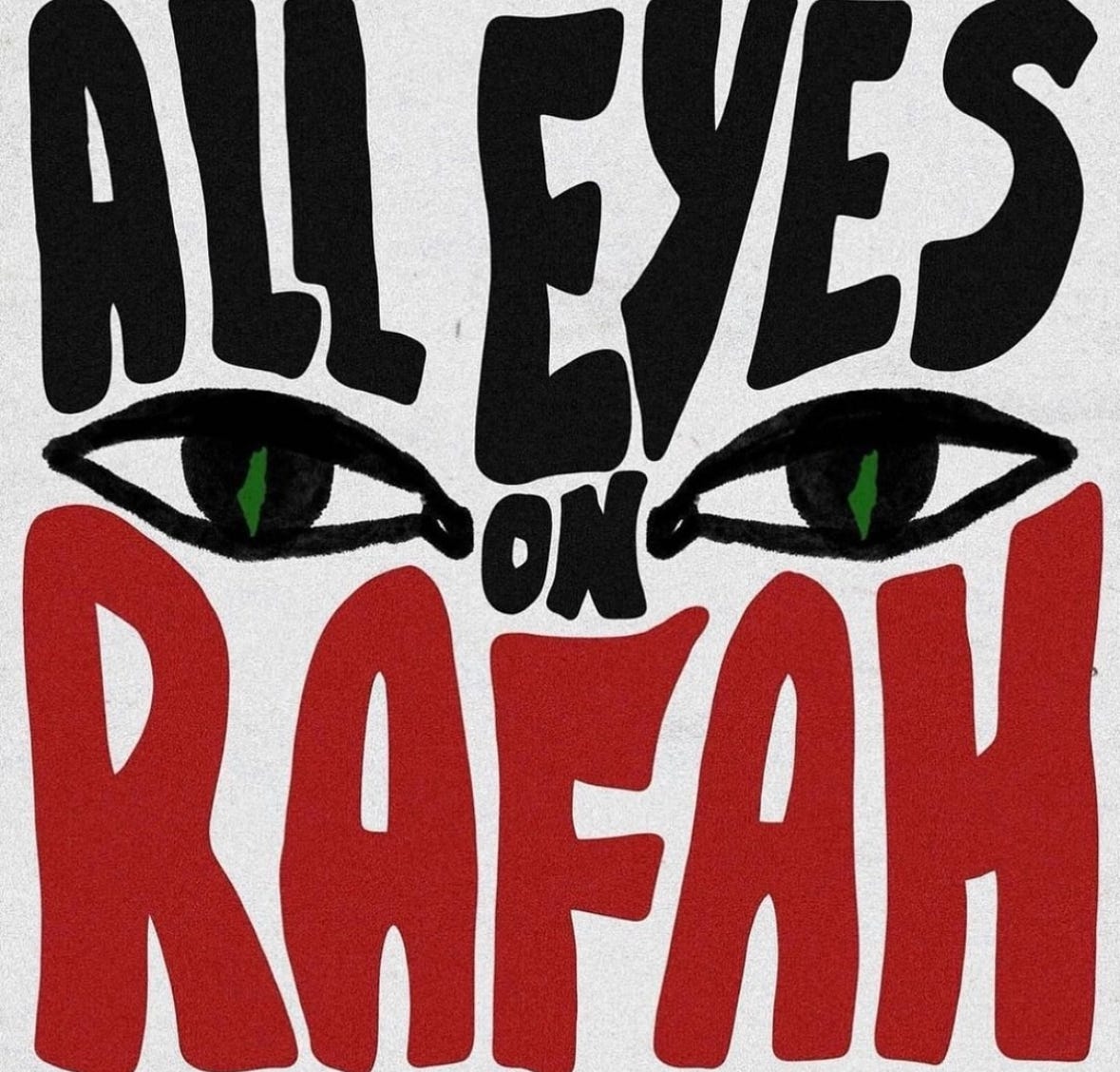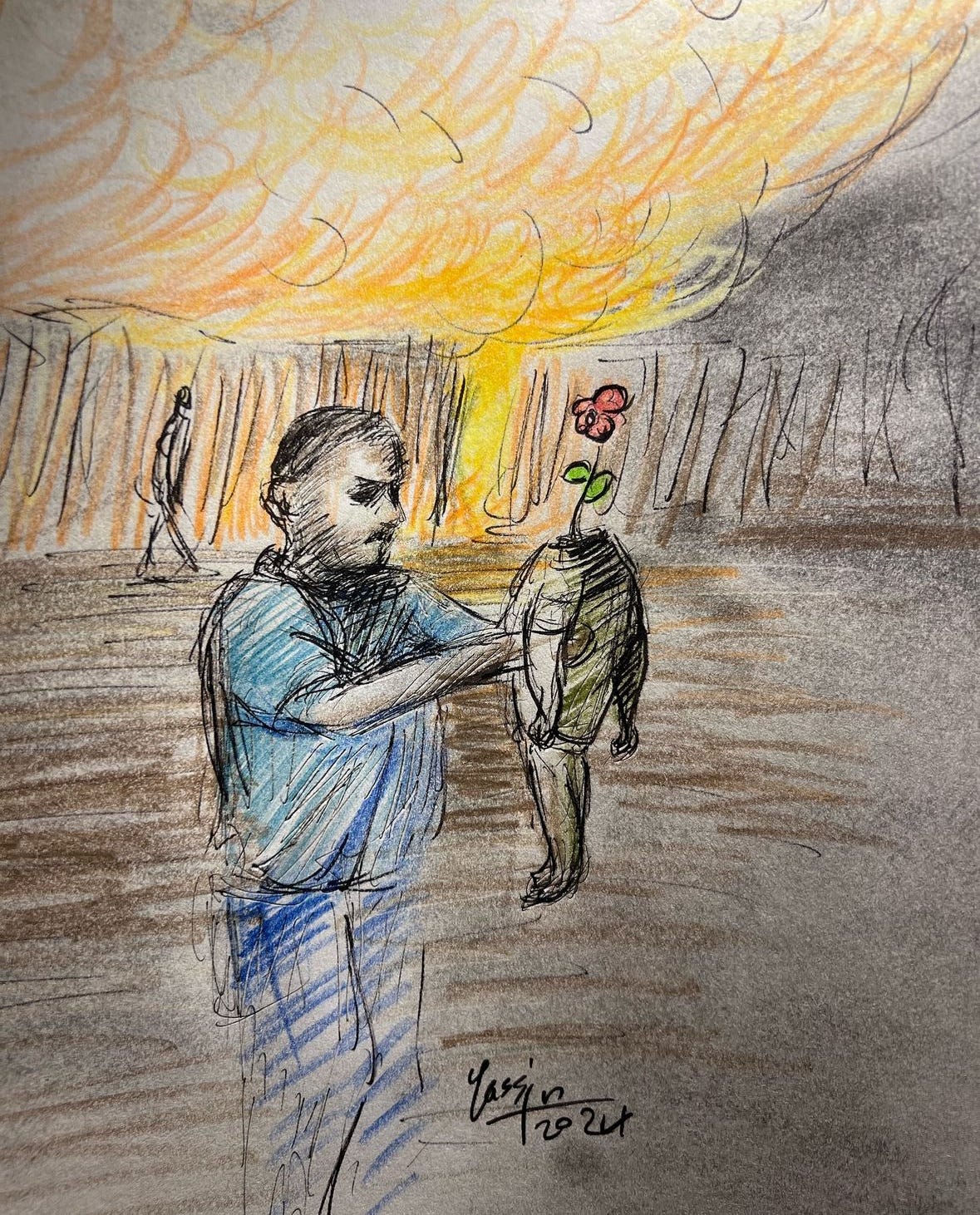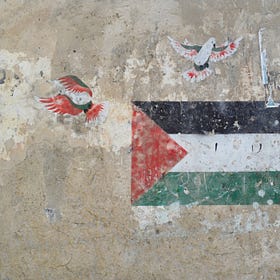
Over the past several weeks, comment sections across social media platforms have been flooded with a common refrain: “All eyes on Rafah.”1
It can be found under videos from the Met Gala, where celebrities flaunted their six-figure evening and made TikToks lip-synching to the Marie-Antoinette-attributed quote “Let them eat cake.” It is posted under college commencement addresses where students walked out as part of their ongoing protests against institutional investment in the military-industrial complex and Israeli-based entities. It is posted on the accounts of celebrities and influencers who are only now talking about Israel’s war in Gaza because it has begun to cost them followers.
Since October, Israeli strikes in Gaza have reportedly killed over 30,000 Palestinians (although, the number is likely much higher). As of April 23, it is estimated that nearly 72% of those deaths are women and children. Evidence of mass civilian casualties, however, was reported as early as November. These deaths have come through relentless airstrikes and ground attacks that have targeted major hospitals, universities, schools, libraries, and neighborhoods. This devastation has displaced 1.7 million Palestinians, many of whom fled south to Rafah near the end of April.
In early May, after forcing Palestinians to travel south, Israel began its attack on the small, densely populated city. Now, only weeks after this initial military advance, the Israeli bombs once again struck Rafah late Sunday night, killing at least 45 Palestinians living in a refuge tent camp as they prepared to sleep. In defying the top United Nations Court’s recent order to immediately halt their attacks on Rafah, terrifying videos have emerged on Instagram and other social media outlets of this attack. They capture burning tents, cries of anguish, mutilated children, and more. These first-hand videos continue to shed light on the ongoing reality of death and devastation that Palestinians have faced since October.
I have never thought of This Common Life as a space for news updates or journalistic reporting on current events. What I’ve briefly named here does not begin to scratch the surface of a century-long conflict that long preceded the events of October 7th and all that has transpired since then.
Rather, I am (something of) a theologian. What this newsletter has consistently offered for the past two years is my perspective on what is happening around us—both locally and globally—in an attempt to offer Christians a path to walk as we engage in these complex issues in a faithful, critical, and constructive manner.
Israel’s war in Gaza is one place where I have seen Christians fail to act in this way. Evangelicals have equated the tribe described in the Hebrew scriptures with this modern-day nation and, in doing so, used the plight of Jewish Zionists to forward their own end-times theologies that require Israel to expand into Palestine to construct a Third Temple. Christians today have also followed a long legacy of dismissing majority non-Christian countries like Palestine as “heathen” as a means of justifying the unmitigated violence enacted against them. Anecdotally, as I speak, write, and post in support of the Palestinian right to freedom, self-determination, decolonization, and justice, it is Christians who are most hostile in their reply.
Reading beyond the attacks and insults, the questions that often arise concern why I do not emphasize Hamas’ October attack on Israel or the hostages they continue to hold.
In March I offered several reasons for this—naming our “temporal tone deafness” and eagerness to ignore the century of conflict that preceded October 7th that went unreported on October 6th, 5th, 4th, and so on. To emphasize the plight of Palestinians is to recognize what is demanded of us in this moment. You can read it here:
I recently came across a response to a similar question on social media from a creator named Yuval. Replying to someone who had asked him why he was vocal in promoting Palestinian relief efforts but not talking about the Israeli hostages held by Hamas, Yuval had several important points that are worth hearing.
What caught my attention was Yuval’s responding question: “Why?” In short, Yuval’s question was not a dismissal of the reality that both Israel and Hamas hold hostages; rather it highlighted that we all know this already. We do not need to raise awareness of the fact that both Israel and Hamas are holding hostages as leverage. This is common knowledge.
But, Yuval notes, what talking exclusively about hostages does is distract us from the only solution to this crisis: the only solution to returning all of the hostages and, Lord willing, ending this cycle of death is a permanent ceasefire. In other words, it is naming that this war will not end until both Israel and Hamas are forced to stop their violence or until Israel is satisfied with its own efforts to eliminate Hamas no matter the number of Palestinian civilian casualties, the death of Israeli hostages, or with any regard to what land Palestinians might have to return to.2

The images and reports coming out of Rafah are gut-wrenching. It is a cruel reality that we can scroll through Instagram or TikTok and see videos of tents burning and bombs falling and then, just one swipe later, watch a new summer rhubarb pie recipe. We become desensitized to the violence and atrocities of our world—even the genocidal murder of children seemingly cannot awaken us to the reality of modern-day ethnic cleansing.
No matter how much I write or speak, a sense of conclusion is always lacking. Whether it is a one-hour panel or a three-hour roundtable discussion, a 500-word post or a 10,000-word essay, a 2-minute video or a 90-minute lecture. So, instead of a “conclusion,” I will offer this:
If I can urge you, reader, to do anything, it would be these three things:
First, LOOK. Turn your eyes towards Rafah today and the people of Palestine who have had their mothers, children, and grandparents torn from this earth and their homes destroyed beyond recognition; who now live in tents without access to the most basic resources or sanitary supplies; who exist with one eye always turned towards the sky awaiting another airstrike, who have been commanded to move farther and farther south as their native lands are destroyed. Look and find God under the rubble in Gaza and with the family of Wadee Alfayoumi, a 6-year-old Palestinian child brutally murdered—stabbed 26 times—in Chicago.
If you consider yourself to be someone of faith, PRAY. Pray in response to the violence we witness. Pray for the families displaced by war. Pray for peace. Pray for wisdom. Pray for a permanent ceasefire and the return of all hostages. Pray for divine intervention to stop the incessant desire for expansion and accumulation. Pray that civilians would be kept from harm. Pray that this present terror would end. Pray for the holy vision to see what kind of people we must be in this moment. Pray that the Palestinian people would have a proper government and responsible leadership that rightly represents them. As Omar Suleiman taught this Ramadan, we must never cease praying “because the du’as of our hearts can literally change the world.”
Finally, as your sight and prayer lead, ACT. Take up that sacred command to care for the orphan and the widow in Gaza (James 1:27). Disrupt systems of power that are active in advancing violence by supplying weapons and profiting financially from war. Call your local representative and make your voice heard. Continue to learn about this conflict and all that preceded October 7th. Find and support a Palestinian family through Operation Olive Branch. And, as my friend Brooke so wonderfully put it, continue to “annoy the powerful.”
You are allowed to say, at any point, I can't support this. Even if you did. Even if you were unsure. You can at any point say "This has gone too far." And while the best time to say that was earlier, the second best time is now.3
As it is with all of my posts, this article does not reflect the views or beliefs of any employer or organization except myself and Scholarship for Religion and Society. I write this in my capacity as a theologian and author.
I emphasize the need for Israel to accept the terms of a permanent ceasefire because 1) they have rejected all of Hamas’ offers to return all hostages in exchange for a permanent ceasefire and 2) they have defied the orders of ICJ to halt their military assaults and 3) Israel’s intentions are clear. PM Netanyahu has repeatedly and consistently claimed that, under his watch, a Palestinian state will never be established.
https://x.com/benFranklin2018/status/1794906335903199266








Thank you for this incredible piece.